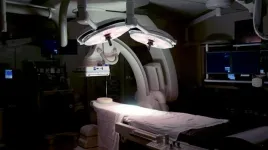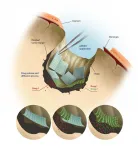(Press-News.org) In March 2020, when the pandemic hit, everything slowed, including non-essential medical procedures such as elective surgeries, to reduce the spread of the coronavirus.
Six weeks later, Mary Byrnes, Ph.D., an assistant research scientist in the Department of Surgery at Michigan Medicine, began calling University of Michigan Frankel Cardiovascular Center patients whose surgeries had been canceled or delayed. She wanted to hear about their experiences -- what undergoing surgery meant to them, how postponing their operations had affected them, whether the existence of the coronavirus complicated how they felt about their bodies and about surgery.
Over the next 10 days, she heard stories of fear: "I'm literally afraid to have my surgery now, and I'm just going day by day on prayer and hoping...that I don't have anything fatal attack my system."
And suffering: "This last week... I've just been struggling. And I...I don't know if it's more symptoms or anxiety or whatever, but...I'm just ready to get this behind me and hopefully live a better life."
As well as altruism: "As much as I want it done, those nurses are overwhelmed right now. They don't need another person in there. Let's hope this starts calming down, and they get a breather before... people are coming in for surgery."
Collectively, the 47 interviews Byrnes conducted -- compiled for a study recently published in Medical Care -- illustrate the profound impact of postponing cardiovascular surgeries due to the COVID-19 pandemic.
"There's been other work coming out that said patients don't really care about delaying their surgeries," says Byrnes, the first author of the study. "But the heart is a different type of organ that has a lot of emotions wrapped around it. It's literary even."
"And even though these were elective surgeries," she adds, "they were serious operations where people were literally having their chests cracked open, and so there was a lot of mental preparation to confront that in the first place. Ultimately, they viewed surgery as a cure, so the unknowing about whether it would happen was problematic for them."
Despite all the uncertainty, many patients preferred to wait to undergo surgery in an effort to avoid catching COVID-19. Some thought they were likely to die of their cardiovascular conditions before their operations could take place, yet they favored passing away of "the devil they knew" over "the devil they didn't," says Byrnes.
In the past year, more Americans have died than would be expected, even when accounting for those who have passed away from COVID-19 or related complications. One of the driving factors may be certain cardiovascular conditions, namely ischemic heart disease -- when narrowed coronary arteries cause heart problems -- and illness related to high blood pressure. States that experienced COVID-19 surges early in the pandemic, including New York and Michigan, also saw a spike in deaths linked to these issues, potentially because patients avoided health care during those periods.
"Patients are suffering even though we don't see them," Byrnes says. "We have to think about our policies and how we talk to patients in terms of the fact that they think they're going to die -- and they might."
As Michigan Medicine and other local health systems begin to delay a small number of surgeries again, thanks to the latest COVID-19 surge in Michigan, this study's findings can inform the decisions hospital leadership makes and create an opportunity for additional communication with and support for cardiovascular patients.
"We need to be upfront and accessible," says Nicholas H. Osborne, M.D., the associate program director of vascular surgery at Michigan Medicine and the last author of the study. "Cancellations should be communicated directly to patients, and surgeons should be available to talk with patients to reassure them."
"As a healthcare system, we may also need to design and implement interventions, such as support systems or social work resources, to minimize the impact these delays have on the well-being of our patients," says Craig Brown, M.D., M.S., a general surgery resident at Michigan Medicine and an additional author of the study. "It is not simply an inconvenience to many of them, but rather has dramatic consequences and substantial psychological impacts on their wellbeing."
INFORMATION:
Additional authors included Ana C. De Roo, M.D., M.S., Matthew A. Corriere, M.D., M.S., Matthew A. Romano, M.D., Shinichi Fukuhara, M.D., and Karen M. Kim, M.D. Byrnes, Corriere, and Osborne are all members of the Center for Healthcare Outcomes and Policy. Brown and De Roo are CHOP fellows.
Psoriasis is a common inflammatory skin condition. The underlying genetic factors have not yet been sufficiently researched. The skin inflammation is usually triggered by external factors such as infections or stress. A research team at the Institute of Cancer Research of the Medical University of Vienna has now managed to identify a new factor in signal transmission of the immune system that plays a major role in the development of a psoriatic episode. The scientists have shown that symptoms can be alleviated by inhibiting the "c-Jun" protein in signal transmission.
The common clinical manifestation of psoriasis is a pinkish-grey thickening of the epidermis in distinct foci of infection, ...
It has been known for about a year that minks can become infected with SARS-CoV-2. The virus had been transmitted from humans to farmed mink and mutated in infected animals. Mutations were acquired in the spike protein, which is crucial for the entry of the virus into host cells and represents the central point of attack for antibodies. These SARS-CoV-2 variants from mink were transmitted back to humans, raising concerns that minks could be a continuing source of infection of humans with SARS-CoV-2 variants with altered biological properties. Researchers at the German Primate Center (DPZ) - Leibniz Institute for Primate Research in Göttingen, Germany, have now shown that an antibody used for COVID-19 ...
A simple dietary supplement reduces behavioral symptoms in mice with a genetic mutation that causes schizophrenia. After additional experiments, including visualizing the fluorescently stained dancing edge of immature brain cells, researchers concluded that the supplement likely protects proteins that build neurons' cellular skeletons.
The supplement betaine was first isolated from sugar beets and is often associated with sweetness or umami flavor. Healthy levels of betaine come from both external food sources and internal synthesis in the body. Betaine ...
Up to 25 percent of global food production is lost annually due to insects, primarily beetles. For the past 500 million years, beetles have successfully spread and adapted to life around the globe and now account for one of every five animal species on Earth. Yet as far back as ancient Egypt, these tough little bugs have invaded granaries and vexed us humans by destroying our crops.
As a result, food production and an abundant use of pesticides now go hand in hand. A large share of these pesticides damage biodiversity, the environment and human health. As various pesticides are phased out, new solutions are required to target and eradicate pests without harming humans or beneficial ...
Atlantic bluefin tuna have returned to UK waters and can once again be seen during the summer and autumn months.
Their numbers appear to be increasing, following a long period of absence linked to population decline, according to research led by Cefas and the University of Exeter.
Marine scientists in the UK and Ireland have analysed multiple datasets, spanning a 16-year period, to document the increase in bluefin, which arrive into the waters of the Celtic Seas and off South West England, the Scilly Isles, and North West Ireland to feed in late summer and autumn.
The research is part of the Defra-funded "Thunnus UK" research project. ...
Stroke risk for patients with traumatic brain injuries is at its highest in the four months following injury and remains significant for up to five years post-injury, finds a new systematic review led by a team at the University of Birmingham.
Traumatic brain injury (TBI) is a global health problem affecting over 60 million people a year worldwide. Incidences of TBI are rising due to a range of factors including increased falls in the elderly, military conflict, sports injuries and road traffic accidents. However, advances in critical care and imaging have led to a reduction in TBI-related mortality.
Previous studies have associated TBI with a long-term risk of neurological diseases including dementia, ...
There are many variants of "goblet cells" in the intestines and they seem to have different functions, according to a new study from the University of Gothenburg. The study indicates that defects in goblet cells of a particular type may be a factor contributing to ulcerative colitis, an inflammatory bowel disease.
The entire inside of our intestines is covered by a thin layer of mucus that protects the fragile mucous membrane (mucosa) from bacteria and other microorganisms. If the microorganisms repeatedly come into contact with the intestinal mucosa, inflammation and even cell changes may result. These increase the risk of intestinal cancer. In a healthy colon, the mucus layer is up to a millimeter ...
Genova (Italy), 16th April 2021 - A micro-sized polymeric net wrapping around brain tumors, just like a fishing net around a shoal of fish: this is the microMESH, a new nanomedicine device capable to conform around the surface of tumor masses and efficiently deliver drugs. It has been described by the researchers of the IIT - Istituto Italiano di Tecnologia (Italian Institute of Technology) in Nature Nanotechnology. The new biomedical implant has been validated in preclinical studies that demonstrate its effectiveness for the treatment of glioblastoma multiforme.
This work has been carried out by the group of Prof. Paolo Decuzzi, head of the IIT Laboratory of Nanotechnology ...
The prevalence of intellectual disabilities, which means difficulties with learning and understanding new things, is roughly 1-2% in the population. People with a severe intellectual disability need help from others in daily activities throughout their lives.
Such disabilities can be caused by genetic changes or external factors. According to estimates, roughly 2,500 genes underlie intellectual disability, of which approximately half remain unidentified.
In recent years, the diagnostics for intellectual disabilities have improved thanks to advancements in techniques that make it possible ...
Language is one of the most notable abilities humans have. It allows us to express complex meanings and transmit knowledge from generation to generation. An important question in human biology is how this ability ended up being developed, and researchers from the universities of Barcelona, Cologne and Tokyo have treated this issue in a recent article.
Published in the journal Trends in Cognitive Sciences, the article counts on the participation of the experts from the Institute of Complex Systems of the UB (UBICS) Thomas O'Rourke and Pedro Tiago Martins, led by Cedric Boeckx, ICREA research professor at the Faculty of Philology ...



